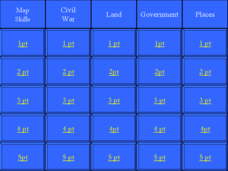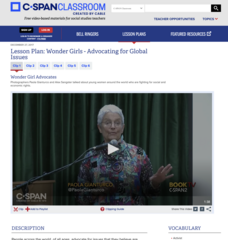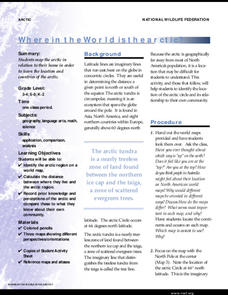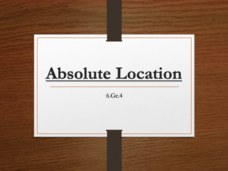Curated OER
Baseball Challenge - Basic Geography Skills
A fabulous presentation/activity based on geography. The author has designed a "baseball game" where batters advance to the next base if they correctly answer a multiple choice question about geography. Geographic terms are used, along...
Curated OER
Blank Jeopardy
Games are a great way to motivate learners to internalize information.. Using this PowerPoint which is in a Jeopardy format, students can review map skills and facts about the Civil War, famous places, and our government. This is a handy...
K20 Learn
Beyond the Zombie Wars: Understanding Culture
New ReviewThe zombies have invaded! Only a few safe regions remain, and class members must decide where they and the remaining world refugees should flee. After researching the cultures and creating poster presentations of various parts of the...
K20 LEARN
But What About Me?: Teaching Perspective In The Social Studies Classroom
How would the story of the discovery of America be different if indigenous people told it through their eyes? Individuals compare the conventional account of this moment in history to an account given by one of the native peoples. After...
ESRI
Juneteenth: An American History through Maps
An interactive website traces the history of Juneteenth celebrations from their origin in Galveston, Texas, on June 19th to the present day. Using interactive maps, learners can find information about the African-American population...
Academy of American Poets
Teach This Poem: "Maps" by Yesenia Montilla
After examining a physical map of the world, learners conduct a close reading of Yesenia Montilla's poem "Maps." They note the interesting words and phrases, the way the poem is structured, and list questions they might have. After...
Angel Island Immigration Station Foundation
Where Is Angel Island? An Introductory Geography Lesson
Prepare young historians for a study of Angel Island Immigration Station with a lesson examining primary and secondary source materials, maps, and websites. Using what they have learned, individuals create a map of Angel Island, labeling...
DocsTeach
Around the World with First Lady Pat Nixon
Travel the world with the First Lady! Academics study images from Pat Nixon's travels as First Lady to discover her role in Richard Nixon's presidency. Historians match images to world locations, complete a worksheet, and participate in...
C-SPAN
Wonder Girls - Advocating for Global Issues
Move over Wonder Woman ... here come the Wonder Girls! Using video clips of photographer Paola Gianturco talking about her work, pupils consider the life experiences of girls around the world, including places such as Tonga and India....
National Wildlife Federation
Where In the World Is the Arctic?
Exactly how far away is the Arctic? Learners use maps to orient themselves to their locations on the globe. They then make calculations to describe how their location relates to the location of the Arctic regions.
Mr. Head's 6th Grade Classroom
Absolute Location
How do we know where we are in the world? A presentation for middle schoolers explains absolute location and other geography terms such as relative location. It also gives scholars the opportunity to practice finding absolute location on...
University of Texas
Understanding Migration
Human migration—often the result of push and pull factors—sometimes has dramatic outcomes for both those leaving their homelands and the host countries. Using a variety of case studies, learners consider those issues. Then, by completing...
Council for Economic Education
Mercantilists and the Midas Touch
What is the connection between greed and mercantilism? Historians consider this question by analyzing a fairy-tale like story about King Midas from the nineteenth century. The background information and excerpt help pupils understand the...
Council for Economic Education
The Columbian Exchange
What did you have for dinner last night? Many scholars ask that question without considering the history behind the foods they eat. Using a simulation, scholars investigate how the foods they eat are the product of the Columbian...
Council for Economic Education
What's the Big Deal about Spices?
Today's gourmands don't consider spices to be the equivalent of silver and gold. During the middle ages, however, these commodities were precious. People back then used spices in religious ceremonies, to cure rotten food, and as a show...
Council for Economic Education
The Economic System of Medieval Europe
How are economics and politics intertwined? Societies in the Medieval period used feudalism for both economic and military reasons. The arrangement provided safety and met other needs. Using the included simulation, individuals...
Council for Economic Education
Economic Systems of the Incas and Aztecs
The Inca and Aztecs created vast economic empires in South America, but how did economics play a role? A simulation activity and reading help scholars evaluate the kinds of markets these great civilizations created. They then consider...
Council for Economic Education
Fall of Rome
What led to the fall of Rome? Scholars have debated the question since the end of the great empire. Young historians consider the same question through an economic lens using an engaging lesson that involves a hands-on evaluation of the...
Council for Economic Education
The Silk Road
The Silk Road connected the European, Middle Eastern, and Asian worlds. It also helped create the modern trade world. An analysis activity makes the importance of this Chinese innovation clear by asking participants to evaluate trades...
Council for Economic Education
The Neolithic Agricultural Revolution
What effect could one person's invention have on the human race? In the case of the Neolithic Agricultural Revolution, small improvements in farming methods led to increased food production. The human population began to boom, leading us...
Council for Economic Education
How Neolithic Farmers Increased Their Standard of Living
How do people improve their economic situations? While many learners may not consider questions about how many crops to grow in ancient times were economic decisions, a hands-on activity encourages individuals to make these connections....
Council for Economic Education
Out of Africa: Why Early Humans Settled around the World
Why would someone want to leave home? The age-old question is at the center of a thought-provoking activity. Scholars consider why humans move around the world both during pre-historical times and today using a PowerPoint, reading on...
Council for Economic Education
Christopher Columbus, Entrepreneur? Queen Isabella, Venture Capitalist?
What did it take to embark on a journey to unknown lands? Perhaps ambition, but also money! Christopher Columbus had to approach more than one European monarch for financing before he could sail the ocean blue. A read-along play and...
Council for Economic Education
Why Didn't China Discover the New World?
Who was Zheng He and why haven't we heard of him? Scholars consider the question as they compare his vast expeditionary force to that of Christopher Columbus. Young historians then ponder the intersection of science, economics, and...

























